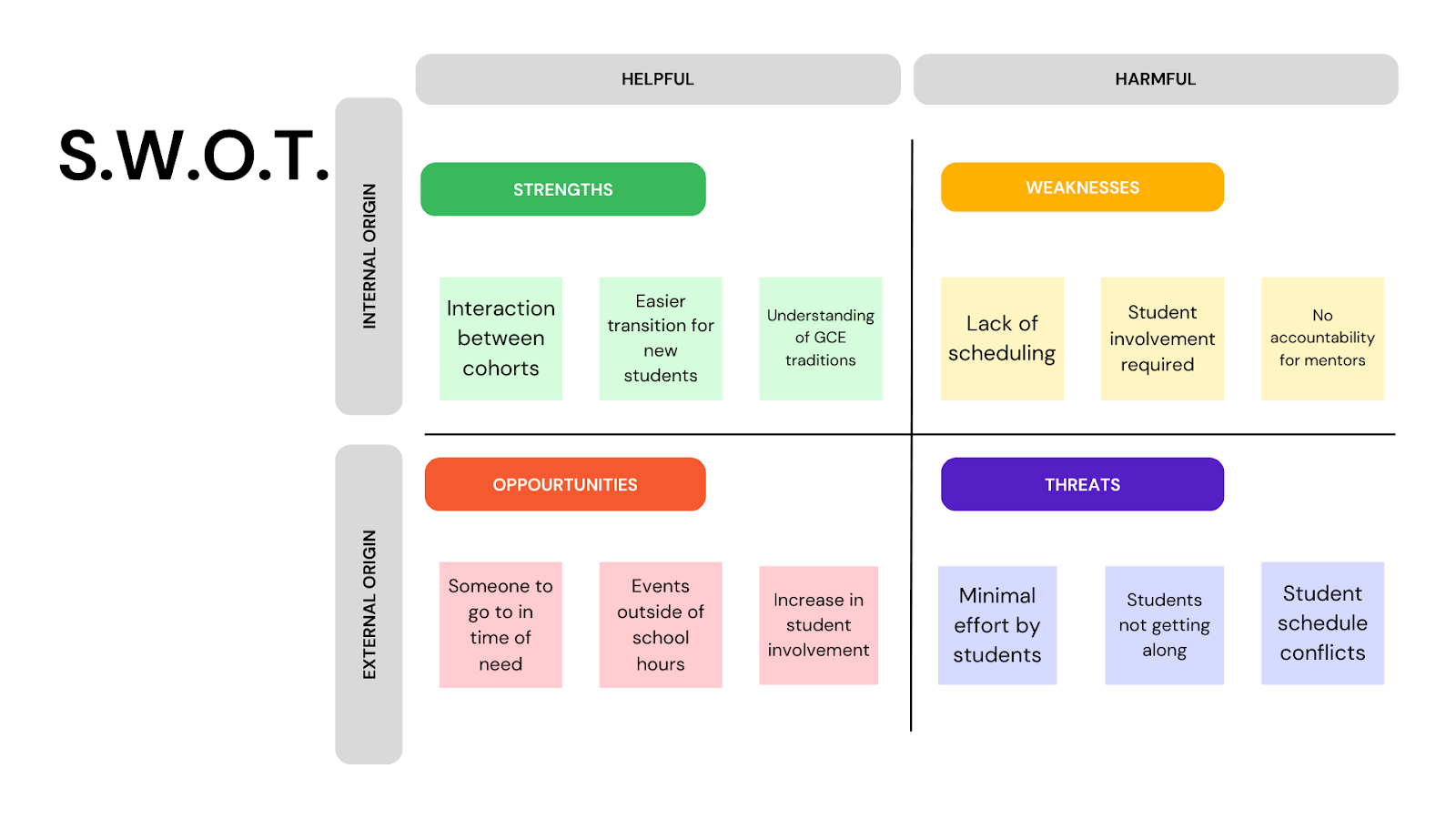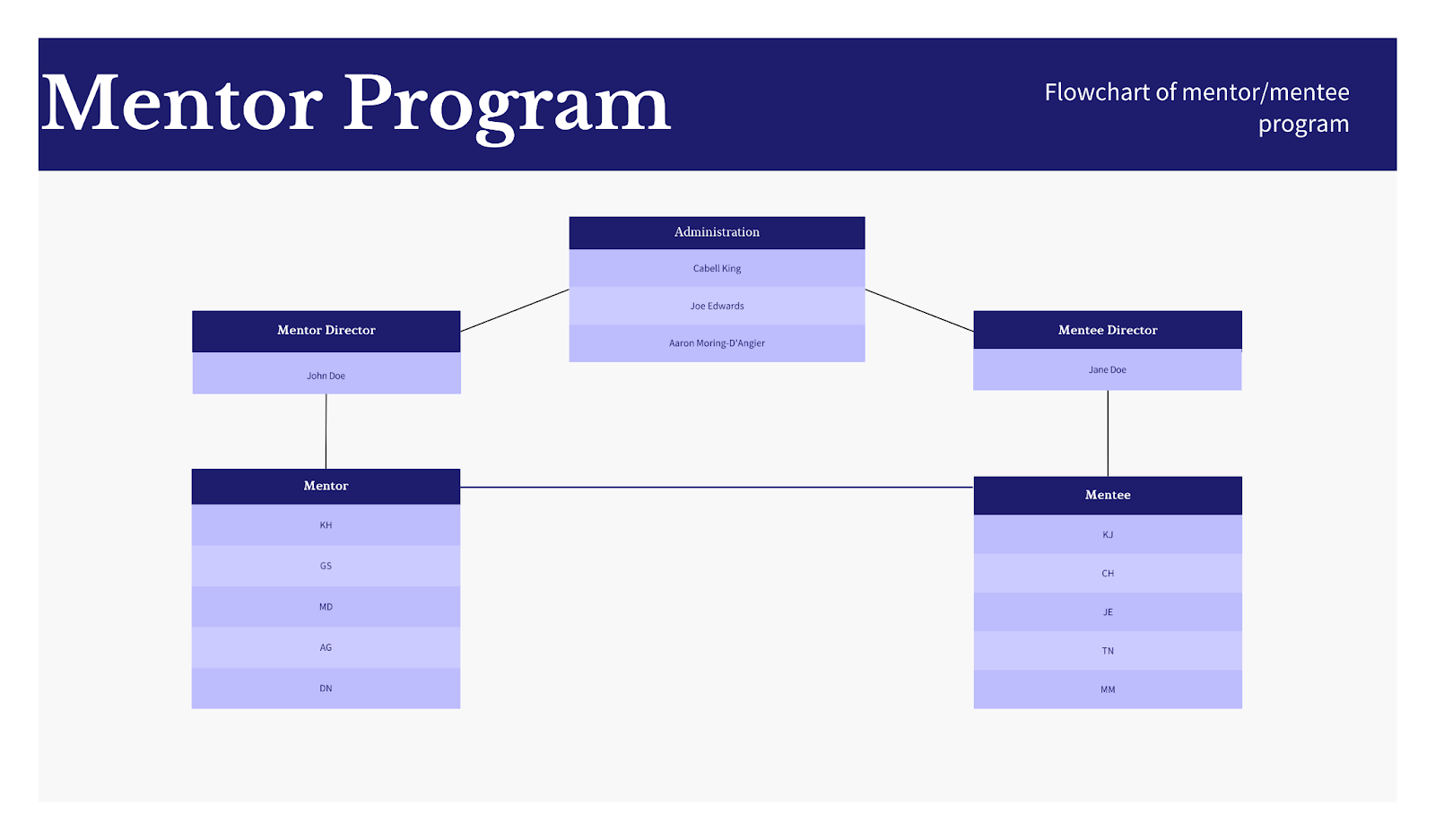The New and Improved Buddy System
This term, I have learned a lot about entrepreneurship. This word is from the French word, “entreprendre” which means to undertake. I think the definition of entrepreneurship is an interesting one because today it relates to one taking something over or to take under their wing. I have seen an issue in my school and decided to take it under my wing. I addressed and altered the aspects of it that didn’t work. Using tools I have learned in my class, Social Entrepreneurship, I was able to look at the system my school has attempted to institute in a more productive manner. I interviewed two people who would give a good insight into the previous attempts. I have laid out what exactly the issue was and how I propose to solve it.
I am currently a senior at GCE Lab School. Presently, we have a concerning amount of students failing classes. We have poor relationships between cohorts and low motivation overall. I want to see a change in all the listed issues. These issues have been reoccurring for a bit of time at GCE. In past years, our student council has attempted to implement a sort of mentorship program, labeled as a Buddy System. This system went under pretty soon after it was implemented.
“I just thought, that the main pillars that we started with in my years just kind of getting lost in translation, whether that was because we were online, or just because, I mean, there were so many changes from like, Head of School, to just staff changes that I just thought that was just, we could be guiding the students ourselves a little bit more.”
When initially implemented Tymony explained that “the Buddy System was supposed to be a mentorship program for usually freshmen, or for transfers to be guided by returning students and also seniors, so they can get the lay of the land GCE, basically, our traditions that we have, how to navigate are new and different school and just become acclimated to the school.”
As a school, we tried this system out, as a returning sophomore, I was paired with an incoming junior. I believe my buddy and I met once over Zoom, exchanged phone numbers, and never talked again.
“So I think that the reason why it didn't succeed is just because we were online and it's hard to block out time in your schedule to basically mentor or talk to some person you don't really know, and you're never gonna meet cause you're behind the screen. So I think that's part of the reason why it didn't work. But I think that, in the beginning, when everybody was kind of on board with it, I thought our meetings went well, I thought they were really fun.”
Soon after implementation, unfortunately, the system fell through. Tymony believes that this was due to the pandemic of 2020 that led to quarantining for some time. Personally, I agree that this was a big factor as to why, at that time, this system failed. Once the school was able to meet in person again, we tried this sort of system again.
In my junior year, I came into the school year with a positive attitude, I wanted to be an upperclassman with good leadership skills. I tried to put myself out there as someone who people could come talk to casually. During orientation, the school announced they would attempt the Buddy System again and I was excited. I would get to meet an incoming student and begin my endeavor of becoming someone who people could talk with. I met my new buddy, a first-year. We talked about the books we were interested in, but past that, we had little connection after that conversation ended.
What happened with this system? I enjoyed meeting with my buddy but I felt an overall rejection of the system by the school. I decided to sit down with a teacher, Hiu To, who took charge of the system back in my junior year. Similarly to Tymony, Hiu felt like the Buddy System failed because of a lack of a system, in the organizational sense. “It was just, ‘here are your buddies.’ I believe there wasn't anyone technically in charge of it and I think maybe some of the buddies didn't necessarily fit.”
Hiu had a different perspective from Tymony on how the system could be improved. While Tymony believed it didn't work out because of the quarantining, Hiu thought it had more to do with the lack of leadership in the system. Hiu offered some ideas on how the system could be improved. “I think it has to be really intentional and transparent with what the goals are right for both the veteran buddy and the new buddy, and I think there needs to be an intentional schedule. Maybe other events that, you know, that we're following through. So I think it just needs an actual plan and not just an idea. I think it needs a staff member who is dedicated to this work.”
It is important to note that when the Buddy System happened my sophomore year, classes were remote and we had Tymony leading whereas, for the Buddy System that happened my junior year, we had been able to be in person, but had less leadership. Overall, we have tried and failed to find an effective system for the integration of cohorts on multiple occasions. My goal is to create a better system.
Below, I have used a framework for looking at the Buddy System. Created by Albert Humphery in the 60s, S.W.O.T. is a method for analyzing aspects of systems within organizations, the pros and cons within and outside of the company’s control.

https://www.canva.com/design/DAFYzfwTQQc/-gGs2pEvaYSx5e3ra5oLJw/edit?utm_content=DAFYzfwTQQc&utm_campaign=designshare&utm_medium=link2&utm_source=sharebutton
I am proposing to create a new program within the school that will be similar to but different from the buddy system. I want to take the aspects of both attempts of the Buddy System that worked well and incorporate them into this new version of the system.
This system will be a mentorship program rather than a buddy program. Using the word ‘buddy’ insinuates that the students involved are expected to become friends. While I do believe that friendship between mentor and mentee would be a great outcome, it is not the focus of the program or an outcome that should be expected. If that is an expectation, and it is not met, it could lead to disappointment. I will also make this program optional for students. I believe if it is optional, we will be able to get considerably more interested students rather than students who would rather be somewhere else. I want our program to act as a space for new students to have a designated returning student to connect with. The intention is for more integration between cohorts which will hopefully lead to overall academic improvement.
This system will consist of mentors, mentees, and two staff members to take on the role of supervisors for mentors and mentees separately. The supervisors will be point persons for mentors and mentees in case of questions or concerns. In order to be a mentor, a student must have attended GCE for at least one year prior to the current school year and have grades of at least 70%. As an incentive for the mentorship program, mentors will be given civic engagement hours.
Below, I have an organizational flow chart to better understand the hierarchy of the program.

https://www.canva.com/design/DAFY_5UKGZs/e6ga-5Z19FgcCNyhqyIsvw/edit
Ultimately, the goal is for this program to be one that will result in cohorts being more integrated because this is a school that builds its foundation on community. This is achievable through student interest. I would like for this program to be finalized and running by the end of the 2023 winter term, in order for this to happen, there will be weekly check-ins to measure progress.

https://www.canva.com/design/DAFY_wdVCDI/sQQoq-MmuuuLSpFftDDKFw/edit?utm_content=DAFY_wdVCDI&utm_campaign=designshare&utm_medium=link2&utm_source=sharebutton
In order for this to be implemented is for student awareness and enthusiasm which, to an extent, is something that is out of GCE’s control. From personal experience, I have had conversations with students who would be interested in being a mentor or having someone to mentor them. We would need for there to be staff involvement to ensure that this program would not go under as soon as classes graduate. If all goes to plan, this program could be majorly beneficial to the community of GCE.
Thank you for looking through my proposal. I’ve been learning a lot in this class and have been able to apply it to something that I really care about. My class has studied human behavior in the form of personality tests and visited the Johnson O’Connor Research Foundation to learn more about this subject and how we can use it to improve systems. While I did not directly address the different aptitudes that people might inherit, it is shown throughout how people’s behavior may directly impact the success of a program. I am going to institute this program in my school and hope for its success.
I am currently a senior at GCE Lab School. Presently, we have a concerning amount of students failing classes. We have poor relationships between cohorts and low motivation overall. I want to see a change in all the listed issues. These issues have been reoccurring for a bit of time at GCE. In past years, our student council has attempted to implement a sort of mentorship program, labeled as a Buddy System. This system went under pretty soon after it was implemented.
I was able to sit down with an alum and previous student body president, Tymony Nolan, to talk about the Buddy System, what worked, and what went wrong. She explained to me that she came up with the idea after being elected in 2020, a notable date being that our school was online at the time. She felt a shift from her experience as a first-year and wanted a system to better acclimate the incoming students to our GCE community.
“I just thought, that the main pillars that we started with in my years just kind of getting lost in translation, whether that was because we were online, or just because, I mean, there were so many changes from like, Head of School, to just staff changes that I just thought that was just, we could be guiding the students ourselves a little bit more.”
When initially implemented Tymony explained that “the Buddy System was supposed to be a mentorship program for usually freshmen, or for transfers to be guided by returning students and also seniors, so they can get the lay of the land GCE, basically, our traditions that we have, how to navigate are new and different school and just become acclimated to the school.”
As a school, we tried this system out, as a returning sophomore, I was paired with an incoming junior. I believe my buddy and I met once over Zoom, exchanged phone numbers, and never talked again.
“So I think that the reason why it didn't succeed is just because we were online and it's hard to block out time in your schedule to basically mentor or talk to some person you don't really know, and you're never gonna meet cause you're behind the screen. So I think that's part of the reason why it didn't work. But I think that, in the beginning, when everybody was kind of on board with it, I thought our meetings went well, I thought they were really fun.”
Soon after implementation, unfortunately, the system fell through. Tymony believes that this was due to the pandemic of 2020 that led to quarantining for some time. Personally, I agree that this was a big factor as to why, at that time, this system failed. Once the school was able to meet in person again, we tried this sort of system again.
In my junior year, I came into the school year with a positive attitude, I wanted to be an upperclassman with good leadership skills. I tried to put myself out there as someone who people could come talk to casually. During orientation, the school announced they would attempt the Buddy System again and I was excited. I would get to meet an incoming student and begin my endeavor of becoming someone who people could talk with. I met my new buddy, a first-year. We talked about the books we were interested in, but past that, we had little connection after that conversation ended.
What happened with this system? I enjoyed meeting with my buddy but I felt an overall rejection of the system by the school. I decided to sit down with a teacher, Hiu To, who took charge of the system back in my junior year. Similarly to Tymony, Hiu felt like the Buddy System failed because of a lack of a system, in the organizational sense. “It was just, ‘here are your buddies.’ I believe there wasn't anyone technically in charge of it and I think maybe some of the buddies didn't necessarily fit.”
Hiu had a different perspective from Tymony on how the system could be improved. While Tymony believed it didn't work out because of the quarantining, Hiu thought it had more to do with the lack of leadership in the system. Hiu offered some ideas on how the system could be improved. “I think it has to be really intentional and transparent with what the goals are right for both the veteran buddy and the new buddy, and I think there needs to be an intentional schedule. Maybe other events that, you know, that we're following through. So I think it just needs an actual plan and not just an idea. I think it needs a staff member who is dedicated to this work.”
It is important to note that when the Buddy System happened my sophomore year, classes were remote and we had Tymony leading whereas, for the Buddy System that happened my junior year, we had been able to be in person, but had less leadership. Overall, we have tried and failed to find an effective system for the integration of cohorts on multiple occasions. My goal is to create a better system.
Below, I have used a framework for looking at the Buddy System. Created by Albert Humphery in the 60s, S.W.O.T. is a method for analyzing aspects of systems within organizations, the pros and cons within and outside of the company’s control.
https://www.canva.com/design/DAFYzfwTQQc/-gGs2pEvaYSx5e3ra5oLJw/edit?utm_content=DAFYzfwTQQc&utm_campaign=designshare&utm_medium=link2&utm_source=sharebutton
I am proposing to create a new program within the school that will be similar to but different from the buddy system. I want to take the aspects of both attempts of the Buddy System that worked well and incorporate them into this new version of the system.
This system will be a mentorship program rather than a buddy program. Using the word ‘buddy’ insinuates that the students involved are expected to become friends. While I do believe that friendship between mentor and mentee would be a great outcome, it is not the focus of the program or an outcome that should be expected. If that is an expectation, and it is not met, it could lead to disappointment. I will also make this program optional for students. I believe if it is optional, we will be able to get considerably more interested students rather than students who would rather be somewhere else. I want our program to act as a space for new students to have a designated returning student to connect with. The intention is for more integration between cohorts which will hopefully lead to overall academic improvement.
This system will consist of mentors, mentees, and two staff members to take on the role of supervisors for mentors and mentees separately. The supervisors will be point persons for mentors and mentees in case of questions or concerns. In order to be a mentor, a student must have attended GCE for at least one year prior to the current school year and have grades of at least 70%. As an incentive for the mentorship program, mentors will be given civic engagement hours.
Below, I have an organizational flow chart to better understand the hierarchy of the program.
https://www.canva.com/design/DAFY_5UKGZs/e6ga-5Z19FgcCNyhqyIsvw/edit
Ultimately, the goal is for this program to be one that will result in cohorts being more integrated because this is a school that builds its foundation on community. This is achievable through student interest. I would like for this program to be finalized and running by the end of the 2023 winter term, in order for this to happen, there will be weekly check-ins to measure progress.
https://www.canva.com/design/DAFY_wdVCDI/sQQoq-MmuuuLSpFftDDKFw/edit?utm_content=DAFY_wdVCDI&utm_campaign=designshare&utm_medium=link2&utm_source=sharebutton
In order for this to be implemented is for student awareness and enthusiasm which, to an extent, is something that is out of GCE’s control. From personal experience, I have had conversations with students who would be interested in being a mentor or having someone to mentor them. We would need for there to be staff involvement to ensure that this program would not go under as soon as classes graduate. If all goes to plan, this program could be majorly beneficial to the community of GCE.
Thank you for looking through my proposal. I’ve been learning a lot in this class and have been able to apply it to something that I really care about. My class has studied human behavior in the form of personality tests and visited the Johnson O’Connor Research Foundation to learn more about this subject and how we can use it to improve systems. While I did not directly address the different aptitudes that people might inherit, it is shown throughout how people’s behavior may directly impact the success of a program. I am going to institute this program in my school and hope for its success.
Works Cited:
Nolan, Tymony. Personal interview. 24 January 2023.
To, Hiu. Personal interview. 26 January 2023.


Comments
Post a Comment